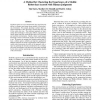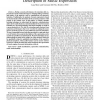1512 search results - page 290 / 303 » Qualitative reinforcement learning |
AAAI
2000
13 years 9 months ago
2000
If robotic agents are to act autonomously they must have the ability to construct and reason about models of their physical environment. For example, planning to achieve goals req...
BMCBI
2006
13 years 7 months ago
2006
Background: While biomedical text mining is emerging as an important research area, practical results have proven difficult to achieve. We believe that an important first step tow...
TASLP
2008
13 years 7 months ago
2008
Abstract--During a music performance, the musician adds expressiveness to the musical message by changing timing, dynamics, and timbre of the musical events to communicate an expre...
INFSOF
2007
13 years 7 months ago
2007
This paper presents a framework that draws on Structuration theory and dialectical hermeneutics to explicate the dynamics of software process improvement (SPI) in a packaged softw...
TFS
2008
13 years 7 months ago
2008
Abstract--In this paper, we introduce a novel approach to timeseries prediction realized both at the linguistic and numerical level. It exploits fuzzy cognitive maps (FCMs) along w...


